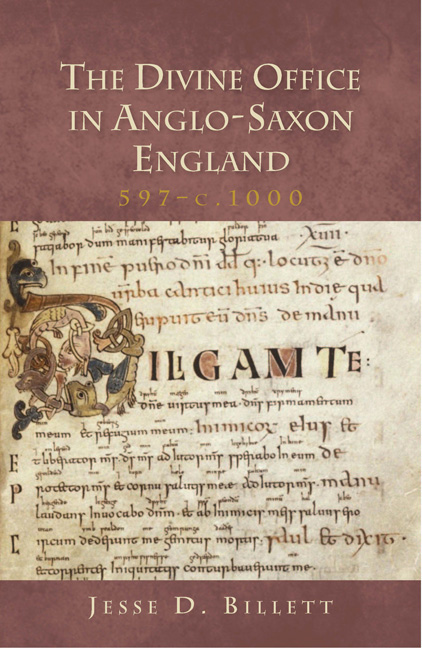Book contents
- Frontmatter
- Dedication
- Contents
- TABLES
- ILLUSTRATIONS
- PREFACE
- NOTE ON USAGE
- ABBREVIATIONS
- MANUSCRIPT SIGLA
- Part I The Historical Development of the Divine Office in England to c.1000
- Part II Manuscript Evidence for English Office Chant in the Tenth Century
- 6 A METHODOLOGY FOR THE STUDY OF ANGLO-SAXON CHANT BOOKS FOR THE OFFICE
- 7 TWO WITNESSES TO THE CHANT OF THE SECULAR OFFICE IN ENGLAND IN THE TENTH CENTURY
- 8 A FRAGMENT OF A TENTH-CENTURY ENGLISH BENEDICTINE ‘BREVIARY’
- 9 A FRAGMENT OF A TENTH-CENTURY ENGLISH BENEDICTINE CHANT BOOK
- 10 CONCLUSION: WAYS OF MAKING A BENEDICTINE OFFICE
- Appendices
- BIBLIOGRAPHY
- INDEX OF MANUSCRIPTS
- INDEX OF LITURGICAL FORMS
- INDEX OF BIBLICAL REFERENCES AND LITURGICAL READINGS
- GENERAL INDEX
8 - A FRAGMENT OF A TENTH-CENTURY ENGLISH BENEDICTINE ‘BREVIARY’
London, British Library, Royal 17. C. XVII, fols. 2–3 and 163–6
from Part II - Manuscript Evidence for English Office Chant in the Tenth Century
Published online by Cambridge University Press: 05 November 2014
- Frontmatter
- Dedication
- Contents
- TABLES
- ILLUSTRATIONS
- PREFACE
- NOTE ON USAGE
- ABBREVIATIONS
- MANUSCRIPT SIGLA
- Part I The Historical Development of the Divine Office in England to c.1000
- Part II Manuscript Evidence for English Office Chant in the Tenth Century
- 6 A METHODOLOGY FOR THE STUDY OF ANGLO-SAXON CHANT BOOKS FOR THE OFFICE
- 7 TWO WITNESSES TO THE CHANT OF THE SECULAR OFFICE IN ENGLAND IN THE TENTH CENTURY
- 8 A FRAGMENT OF A TENTH-CENTURY ENGLISH BENEDICTINE ‘BREVIARY’
- 9 A FRAGMENT OF A TENTH-CENTURY ENGLISH BENEDICTINE CHANT BOOK
- 10 CONCLUSION: WAYS OF MAKING A BENEDICTINE OFFICE
- Appendices
- BIBLIOGRAPHY
- INDEX OF MANUSCRIPTS
- INDEX OF LITURGICAL FORMS
- INDEX OF BIBLICAL REFERENCES AND LITURGICAL READINGS
- GENERAL INDEX
Summary
The five parchment end-leaves of Royal 17. C. XVII in the British Library (fols. 2–3 and 163–6) are all that remains of what was apparently once a complete liturgical book containing biblical readings, prayers, and chants for the eight daily services of the Divine Office as it was sung in an Anglo-Saxon church. It has received very little attention from scholars. Appearing as number 498 in Helmut Gneuss's Handlist, it is described as a fragmentary breviary dating from the end of the tenth century or the first half of the eleventh. The British Library's catalogue entry for Royal 17. C. XVII offers slightly more information:
The vellum end-leaves (their true order is ff. 163, one missing, 164–166, 2, 3), in an English hand of the 10th cent., are portions of a lectionary in Latin for the greater hours, with collects and antiphons, containing the days from Monday in Passion Week till Easter Eve. There is nothing to indicate provenance.
It is easy to see why this source has not been the subject of deeper investigation. Apart from several simple initials, it lacks any decoration. Its chants are not provided with musical notation. The text is so badly worn as to be illegible in places, and whole lines have been trimmed off. On first inspection, the fragment thus presents little interest to the art historian or the musicologist, and the palaeographer faces obstacles from the outset.
- Type
- Chapter
- Information
- The Divine Office in Anglo-Saxon England, 597-c.1000 , pp. 252 - 300Publisher: Boydell & BrewerPrint publication year: 2014



